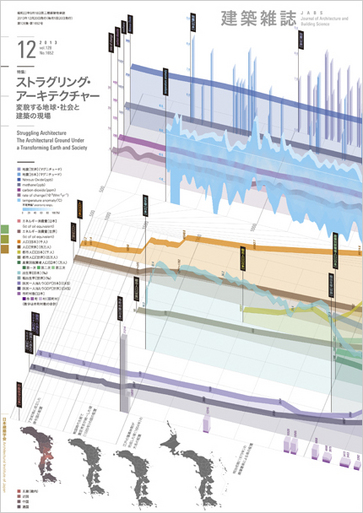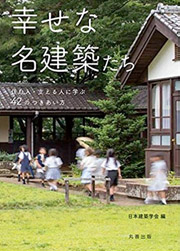本文PDFの閲覧につきましては、こちらでご確認ください。

2013-12月号 DECEMBER
特集= ストラグリング・アーキテクチャー
─変貌する地球・社会と建築の現場
Struggling Architecture─The Architectural Ground Under a Transforming Earth and Society
特集前言 建築の「地盤」が揺れ動く
私たちはどんな「地盤」の上に生活を組み立てていたのか。私たちが意識せずに済ませられる「地盤」はどれほどの広がりに及ぶのだろうか。そんな「地盤」たちが無意識の底から残骸となって姿を現し、僕たちだって君たちがつくったものだろうと語りかける―― 災害はこんなふうにして日常の無意識を露わにする。
「地盤」、つまり道路や堤防、法や基準、教育と資格、その他あらゆる社会体制、そして文字どおりの地盤そのものも含めて、それらは国家が保証している。特に近代国家はそうした「地盤」をどんどん官僚と資本の論理に吸収し、私たちはそれらについて考える責任を手放してきた。
こう考えれば察しがつくように、いわゆる国土強靭化構想は近代国家の論理の延長上にあり、国家が包括的なセキュリティ保証の今日的チューニングを強力に推し進めるほどに、私たちの無意識の領域はますます肥大化するだろう。技術史は、とりわけ近代においては、高度化する技術を制御する技術の歴史である。そして、リスク制御技術が高度化すればするほど、潜在的に抱え込むリスクも大きくなり、私たちには手が出せなくなる。社会工学的な技術も同様であろう。ではどうすればよいのか。
本号は今期編集委員会の最終号である。「3.11」以後に始動した当委員会の2年間を振り返って思うのは、建築の「地盤」が揺らいでいるという認識はいよいよ当然のものとなり、むしろ、ではいかにして「地盤」の再構築を進めていけばよいのかが、社会のあらゆる現場で問われており、震災が投げかける問題群もその一部なのだということである。ただし、震災の衝撃は、私たちの認識にバイアスをかけ、特定の方向に尖らせてしまっている可能性もある。建築は、つねにホーリスティックに社会システムを鋭く力強く問いつつ、実践においては価値の分散や対立をも受け入れうるような、柔軟で弱い学・術であり続けねばならないだろう。
そこで本号では、再構築されねばならない建築の「地盤」をいくつかのトピックに整理し、建築分野の外から専門家を招いて、現状の観察とともにむしろ大きな歴史的パースペクティブとグローバルな見通しを提供いただき、建築分野の専門家と共にクリティカルな課題を浮き彫りにしていく五つの座談会で構成した。
「A 災害」は、社会心理学から災害リスク問題にアプローチする矢守克也氏と、建築構造学の高田毅士氏、建築史学の中谷礼仁氏による座談会とした。議論はリスク論の広大な広がりをなぞるように縦横に展開し、不確実性を扱う技術者の倫理が市民の生活倫理とどう交わるのかを示唆する。
「B 気候」では、地理学・気象学の吉野正敏氏、土木分野で海岸工学を専門とする三村信男氏を招き、建築分野からは都市環境工学の佐土原聡氏がテーブルについた。ここでも幾重ものタイム・スケールを往復する議論が、近視眼的になりがちな視野を解きほぐし、社会・文化・技術にわたる問題の射程を描く。
「C 社会」をテーマとする座談会では、建築計画学の園田眞理子氏・伊藤俊介氏が、アフリカ地域研究・環境社会学の西﨑伸子氏と共に、「か弱き個人」が露出せざるをえない被災地の現場から、今後のさまざまな社会のかたちを生み出すための議論を交わす。
「D 経済」は、経済地理学者の水岡不二雄氏と、建築出身で地域政策・地域開発論の遠州尋美氏との対談である。グローバルな情勢の観測では一致する両氏が、被災地あるいは日常的な社会での具体的な運動の可能性については立場を異にする構図から、今日の経済環境下での政治と倫理をめぐる困難な問題が浮かび上がるように思われる。
「E 政治」では、社会学の大矢根淳氏、政治学の廣瀬克哉氏、そして建築家の藤村龍至氏によって、地方分権社会の現状とガバナンスの課題が議論される。経験のアーカイブ化と活用、意思決定、すなわち諸要素の複合的統合がいかに市民に開かれたかたちで実現されうるのか、そのプロセスのデザインが求められている。
言うまでもなく、これらの問題系が互いに重なり合い、浸透し合っていることに読者は自ずと気付くだろう。なお、これら座談会(対談)の間には、2012年1月号~ 2013年11月号までの本誌特集・連載、ならびにバックナンバーへのレファレンスを挿入している。
会誌編集委員会
本号編集担当:牧紀男(京都大学防災研究所)・渡邉浩文(東北工業大学)・初田香成(東京大学)・大沼正寛(東北工業大学)・饗庭伸(首都大学東京)・青井哲人(明治大学)
[目次]
| 000 | 連載 再建への意志:図面のなかの都市復興 鎌原村復興絵図/渡辺尚志 |
| 002 | 連載 東日本大震災|連続ルポ1|動き出す被災地 ルツェルン・フェスティバル アーク・ノヴァ/吉田涼子 |
| 004 | 連載 東日本大震災|連続ルポ2|仮すまいの姿 大槌町における被災者の実情レポート/大水敏弘 |
特集 ストラグリング・アーキテクチャー─変貌する地球・社会と建築の現場
| 006 | 特集前言 建築の「地盤」が揺れ動く |
A 災害
| 009 | 座談会 リスクとは何か─不確実性に向き合うために/高田毅士 × 中谷礼仁 × 矢守克也 |
| 014 | 『建築雑誌』2012-13 INDEX 災害と復興 |
B 気候
| 016 | 座談会 気候変化のタイムスケールと社会・文化・技術/佐土原聡 × 三村信男 × 吉野正敏 |
| 021 | 『建築雑誌』2012-13 INDEX 日本と世界/都市と地域 |
C 社会
| 023 | 座談会 露出する「か弱き個人」から新しい社会・建築像へ/西﨑伸子 × 園田眞理子 × 伊藤俊介 |
| 028 | 『建築雑誌』2012-13 INDEX 技術・産業と倫理 |
D 経済
| 030 | 対談 グローバル都市間競争と生きられた実空間のあいだで/遠州尋美 × 水岡不二雄 |
| 036 | 『建築雑誌』2012-13 INDEX アカデミーとプロフェッション |
E 政治
| 038 | 座談会 地方分権社会における統治と建築学/大矢根淳 × 廣瀬克哉 × 藤村龍至 |
| 043 | 編集後記 青井哲人 |
| 044 | 特集を読んで 2013年10月号|特集:アフリカ・アトラス─サブサハラと日本の都市・建築 遠い、魅力/田中亙 アフリカの人々の眼差し/吉村輝彦 |
| 045 | 連載 建築の争点 オリンピックという両刃の剣/白井宏昌 |
| 046 | 連載 ケンチク脳の育て方 復興とともに育つ建築教育/土岐文乃 |
| 047 | 連載 ケンチク脳の活かし方 建設会社からイラストレーターへ─難しいことをわかりやすく描く/上大岡トメ |
| 048 | 連載 地域いろいろ・多様な日本 複数のまち会社が競争・協調する、米子型まち再生プロジェクト/木下斉 + 杉谷第士郎 |
Preface to the Special Issue: The Architectural Ground Trembles
On what sort of ground have we constructed our life? How expansive can that ground be yet remain beyond our attention? Such grounds show up as wreckage from the bottom of unconsciousness and say to us that they too are things that we made - disasters reveal daily unconsciousness in such a way.
The ground, in other words, roads and embankments, laws and standards, education and qualifications, all other social systems, and including the literal ground itself - these a nation guarantees. A modern nation especially has absorbed such grounds one after another into the bureaucracy and logic of capital, and we have relinquished responsibility for thinking about them.
Thinking like this, as you can guess, the idea of so-called national resilience is an extension of the logic of a modern nation, and the more a nation pushes ahead with today's tuning of comprehensive security guarantees, the larger becomes our area of unconsciousness. Technological history, particularly in the modern period, is the history of technology that controls highly developing technologies. And as risk-control technology becomes higher and higher, latently contained risk becomes greater and greater, and we then cannot lay a hand on it. I guess the technology of social engineering is similar to this. So, what to do?
This issue is the last one by the present-term editorial board. Looking back at the board's two years that started right after 3.11, our thought is that the awareness that the architectural ground is shaking has become increasingly a matter of course; if anything, it is asked in all fields of society how the reconstruction of the ground should be advanced, and a group of issues thrown up by the earthquake are part of it. Yet it's possible that the earthquake's shock biased our recognition and sharpened it in a particular direction. Architecture, always asking holistically, keenly, and powerfully about social systems, might well have to remain a flexible and weak science that can accept even the scattering or confrontation of values in practice.
So in this issue we organize into several topics the architectural ground that should be reconstructed; invite experts from outside the architectural field to offer deep historical perspectives and global outlooks, all with observations of the status quo; and form five round tables of architectural experts that throw critical issues into relief.
"A. Disasters" is a round-table talk between Katsuya Yamori, who approaches disaster-risk problems from social psychology, structural engineering's Tsuyoshi Takada, and architectural history's Norihito Nakatani. The discussion develops freely, as if tracing the vast extent of risk theory, and suggests how the ethics of engineers who treat uncertainty keeps company with the life ethics of citizens.
In "B. Climate," we invite Masatoshi Yoshino from geography and meteorology, and Nobuo Mimura, a coastal engineering specialist in the civil engineering field, and Satoru Sadohara from urban environmental engineering in the architectural field also comes to the table. Here too, discussions that go to and fro in various timescales disentangle an oftenshortsighted field of vision and draw a range of issues that cover society, culture, and technology.
In round-table talk "C. Communities," whose theme is family and the local community, Mariko Sonoda and Shunsuke Itoh, from architectural planning and design, argue with Nobuko Nishizaki, from Africa area studies and environmental sociology, to produce various future social shapes from disaster fields wherein weak individuals have no choice but to be exposed.
"D. Economics" is a talk by the economic geographer Fujio Mizuoka and Hiromi Enshu, who moved from architecture to regional policy and community development. From the composition - in which the two men agree about observations of global conditions but take different standpoints on the possibility of concrete movements in disaster areas or daily communities - the difficult problems concerning politics and ethics in today's economic environment seem to be surfacing.
In "E. Politics" Jun Oyane, from sociology, Katsuya Hirose, from political science, and Ryuji Fujimura, an architect, discuss issues of a decentralized society's status quo and governance. The archiving and applying of experiences, and decision making - that is to say, a compound unification of all elements - how could that all be realized in a shape open to citizens? The design of that process is demanded.
Needless to say, readers will naturally notice that these issue systems lie on top of and interpenetrate one another. Further, the references for feature and serial articles of JABS 2012.1 - 2013.11 and back numbers are inserted among these round-table talks and conversations.
Editorial Board
This issue has been edited by Norio Maki (Disaster Prevention Research Institute Kyoto University), Hironori Watanabe (Tohoku Institute of Technology), Kosei Hatsuda (The University of Tokyo), Masahiro Onuma (Tohoku Institute of Technology), Shin Aiba (Tokyo Metropolitan University), and Akihito Aoi (Meiji University).
[Contents]
| 000 | [Series] The Resolve to Rebuilding: City Reconstruction in Blueprint Map of Reconstruction in the Kambara Area / Takashi Watanabe |
| 002 | [Series] Great East Japan Earthquake Serial Report 1 Devastated Areas Have Just Started to Stir LUCERNE FESTIVAL ARK NOVA / Ryoko Yoshida |
| 004 | [Series] Great East Japan Earthquake Serial Report 2 Life in Temporary Housing The Report of Tsunami Victim' s Circumstances in Otsuchi Town / Toshihiro Omizu |
Special Feature
Struggling Architecture─The Architectural Ground Under a Transforming Earth and Society
| 006 | [Preface to the Special Issue] The Architectural Ground Trembles |
A Disasters
| 009 | [Discussion] What Risk Is─For Facing Uncertainty / Tsuyoshi Takada × Norihito Nakatani × Katsuya Yamori |
| 014 | [JABS 2012-2013 INDEX] Disaster and Recovery |
B Climate
| 016 | [Discussion] Timescales of Climate Change, and Society, Culture, and Technology / Satoru Sadohara × Nobuo Mimura × Masatoshi Yoshino |
| 021 | [JABS 2012-2013 INDEX] Japan and the World / Cities and Regions |
C Communities
| 023 | [Discussion] From Exposing Weak Individuals to New Communities and Architectural Images / Nobuko Nishizaki × Mariko Sonoda × Shunsuke Itoh |
| 028 | [JABS 2012-2013 INDEX] Engineering, Industry, and Ethics |
D Economics
| 030 | [Dialogue] Between Global Competition and Lived Places / Hiromi Enshu × Fujio Mizuoka |
| 036 | [JABS 2012-2013 INDEX] Academe and Professions |
E Politics
| 038 | [Discussion] Governance and Architecture in a Decentralized Society / Jun Oyane × Katsuya Hirose × Ryuji Fujimura |
| 043 | [Editor's Postscripts] Akihito Aoi |
| 044 | [Reviews of Previous Issue] 2013, October|Atlas of Sub-Saharan Africa for Japanese Urbanism and Architecture Sub Sahara, beyond the distances / Wataru Tanaka African People' s Perspective / Teruhiko Yoshimura |
| 045 | [Series] Issues in Architecture The Olympics, a Double-Edged Sword / Hiromasa Shirai |
| 046 | [Series] Cultivating Versatile Architects Architectural Education Grow Up with Recovery Process / Ayano Toki |
| 047 | [Series] Architects Branch Out A Construction Company Worker Becomes an Illustrator ─Drawing the Unintelligible Intelligibly / Tome Kamiooka |
| 048 | [Series] Local Identities: Diverse Japan A Yonago-Style Town-Regeneration Project in Which Several Such Companies Compete and Cooperate / Hitoshi Kinoshita + Daishiro Sugitani |





 『幸せな名建築たち 住む人・支える人に学ぶ42のつきあい方』
『幸せな名建築たち 住む人・支える人に学ぶ42のつきあい方』





